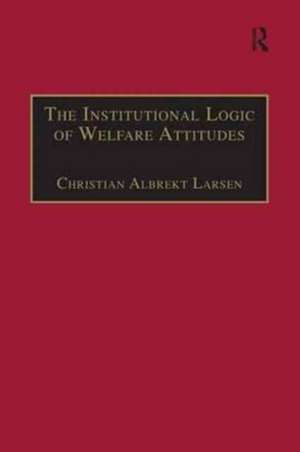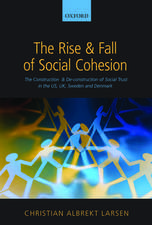The Institutional Logic of Welfare Attitudes: How Welfare Regimes Influence Public Support
Autor Christian Albrekt Larsenen Limba Engleză Paperback – 9 sep 2016
| Toate formatele și edițiile | Preț | Express |
|---|---|---|
| Paperback (1) | 331.87 lei 6-8 săpt. | |
| Taylor & Francis – 9 sep 2016 | 331.87 lei 6-8 săpt. | |
| Hardback (1) | 817.51 lei 6-8 săpt. | |
| Taylor & Francis – 18 oct 2006 | 817.51 lei 6-8 săpt. |
Preț: 331.87 lei
Preț vechi: 379.23 lei
-12% Nou
Puncte Express: 498
Preț estimativ în valută:
63.52€ • 66.06$ • 53.23£
63.52€ • 66.06$ • 53.23£
Carte tipărită la comandă
Livrare economică 14-28 martie
Preluare comenzi: 021 569.72.76
Specificații
ISBN-13: 9781138251373
ISBN-10: 1138251372
Pagini: 184
Dimensiuni: 156 x 234 mm
Greutate: 0.45 kg
Ediția:1
Editura: Taylor & Francis
Colecția Routledge
Locul publicării:Oxford, United Kingdom
ISBN-10: 1138251372
Pagini: 184
Dimensiuni: 156 x 234 mm
Greutate: 0.45 kg
Ediția:1
Editura: Taylor & Francis
Colecția Routledge
Locul publicării:Oxford, United Kingdom
Cuprins
Contents: Preface; Introduction; Welfare regimes and the attitudes of their inhabitants; The puzzle of public opinion; Welfare regimes and deservingness; Welfare regimes and perceived causes of poverty; Selectivism and stigmatisation; Generosity and stigmatisation; Regime-dependent perceptions and social assistance; Deservingness and welfare state development; References; Index.
Notă biografică
Christian Albrekt Larsen is Assistant Professor at the Centre for Comparative Welfare Studies at Aalborg University, Denmark. He has previously, together with Professor Jørgen Goul Andersen, written on Nordic labour markets and welfare reforms (pension, early retirement, tax and labour market policy). The work has been published in two books and a number of international articles. He is currently involved in two large projects; respectively about the importance of the networks of long-term unemployed and the dynamics behind the transformation of the Danish welfare state.
Recenzii
'Despite decades of intense research, it has proven difficult to establish any clear link between public attitudes and welfare types. This book breaks new ground not only because it succeeds in demonstrating a clear empirical connection but also because it does so with exemplary analytical power. Christian Albrekt Larsen succeeds, like none before him, in uncovering the precise mechanisms that shape citizens' support for policy. And he does it with rigor and elegance. This is a book that must be read.' Gosta Esping-Andersen, Universitat Pompeu Fabra, Spain 'This book contributes substantially to the understanding of the formation of popular attitudes towards poor and unemployed people by showing with great empirical detail how the deservingness beliefs of people, which are behind such attitudes, are driven by institutional aspects of the type of welfare state people live in. The causal mechanisms between macro-level institutions and micro-level attitudes, which thus far have often remained a black box, are explored theoretically and laid out empirically in an exemplary way.' Wim van Oorschot, Aalborg University and Tilburg University, Denmark 'This book looks at the long neglected macro-micro link between welfare state regimes and citizens' welfare attitudes. It makes splendid use of a wide range of survey research on major issues as deservingness, poverty and stigmatisation. Because of the systematic cross-national comparison of welfare attitudes, this book is really a must for those studying the vicissitudes of the three worlds of welfare capitalism.' Wil Arts, Tilburg University and University College, The Netherlands 'This will become a key work for anyone attempting to understand how state structures impact on societal attitude formation.' Sociology
Descriere
By examining how different welfare regimes influence public support for welfare policy, this book explores the institutional settings of different regimes and how each produces its own support. The result is an important work for all studying and working in the fields of public policy and social welfare.

